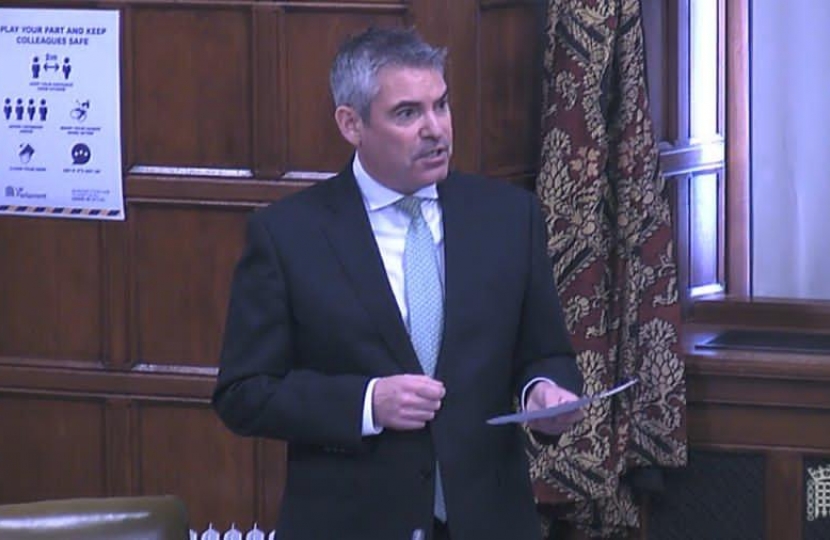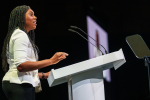
Craig Tracey MP, Co-Chair of the All-Party Parliamentary Group on Breast Cancer held a crucial Parliamentary debate to discuss the significant impact the Covid-19 pandemic has had on the diagnosis and treatment of breast cancer. This was the first to be held in Parliament on cancer since the start of the pandemic and highlighted many key issues from experiences of having breast cancer during a pandemic to the impact of Covid-19 across the whole breast cancer pathway, including diagnosis, treatment, clinical trials and research.
The North Warwickshire and Bedworth MP opened up the debate by revealing just how significant an impact the pandemic has had on breast cancer, with an estimated 1 million women in the UK missing out on the cancer screening programme and a drop in referrals for those with suspected cancer symptoms; Mr Tracey focused on the issue of patients having their treatment and surgeries delayed, which causes huge anxiety, particular for patients with incurable secondary breast cancer and their families.
Secondary breast cancer, also known as metastatic or Stage 4 is where it has spread to other parts of the body. Although it can be controlled for many years, it is not curable. However, because of improved treatments, women with secondary breast cancer are living for longer, which is why regular treatment to control the cancer improves symptoms and gives patients a chance to manage the disease with a better quality of life.
Commenting on this, Mr Tracey said:
‘’We have made great strides with the early diagnosis and treatment of primary breast cancer, but to put it into context, about 1,000 women still die every month from the disease in this country, with the vast majority from secondary breast cancer, so it is a considerable issue that we need to address.
I hosted my first ever debate on this very subject five years ago, about inequalities in the system and secondary breast cancer patients often being overlooked. Sadly, for various different reasons, since my 2015 speech nothing much has changed, which I know frustrates many people besides myself.''
Mr Tracey also demonstrated the need for more Clinical Nurse Specialists (CNSs) who play a crucial role in providing palliative care and support to patients for secondary breast cancer and their loved ones too, helping them to manage their diagnosis. Furthermore, he pointed out a key issue which if addressed would make a huge difference to patients, something he also raised in 2015 - a lack of understanding of the data on secondary breast cancer, which means we do not know how many people are diagnosed with it each year, how long they are living for, how the disease spreads or what kind of treatment and support they are receiving.
He went on to add:
''Despite it being mandatory since 2013 for hospitals to collect data on their new diagnoses of metastatic cancer, Research by Breast Cancer Now in 2016, repeated in 2018, showed that that is still routinely not happening. In the 2018 study, a staggering 40% of hospital trusts and health boards across the UK were still unable to tell Breast Cancer Now how many secondary breast cancer patients were under their care.''
As a result, Mr Tracey called for funding from the Government Spending Review, scheduled for 25 November, to be allocated to a National Secondary Breast Cancer Audit to collate these vital figures, as well as increased funding for the cancer workforce.
Responding on behalf of the Government, Cancer Minister, Jo Churchill MP, who herself has twice overcome Breast Cancer said:
"I congratulate him on securing the debate and on the important work he does running the APPG on breast cancer with his co-chair. I know that he has been a fundraiser for breast cancer and that, like me, he came to this place with tackling this issue as one of his key ambitions. We will get there”
"I am happy to work with my hon. Friend on an audit. We need to get better data. It is collected, but not in a good enough format. I want to see us do better in all those areas.”
Speaking immediately after the debate, Mr Tracey commented:
''I was honoured to lead such an important, constructive debate and really welcome this fantastic opportunity to build back our cancer services better than ever, and I look forward to working with the Cancer Minister to see what we can achieve together - we are already making plans for our next meeting.
I want to also take this opportunity to commend all the palliative care teams up and down the country for all the incredible work they do.''

